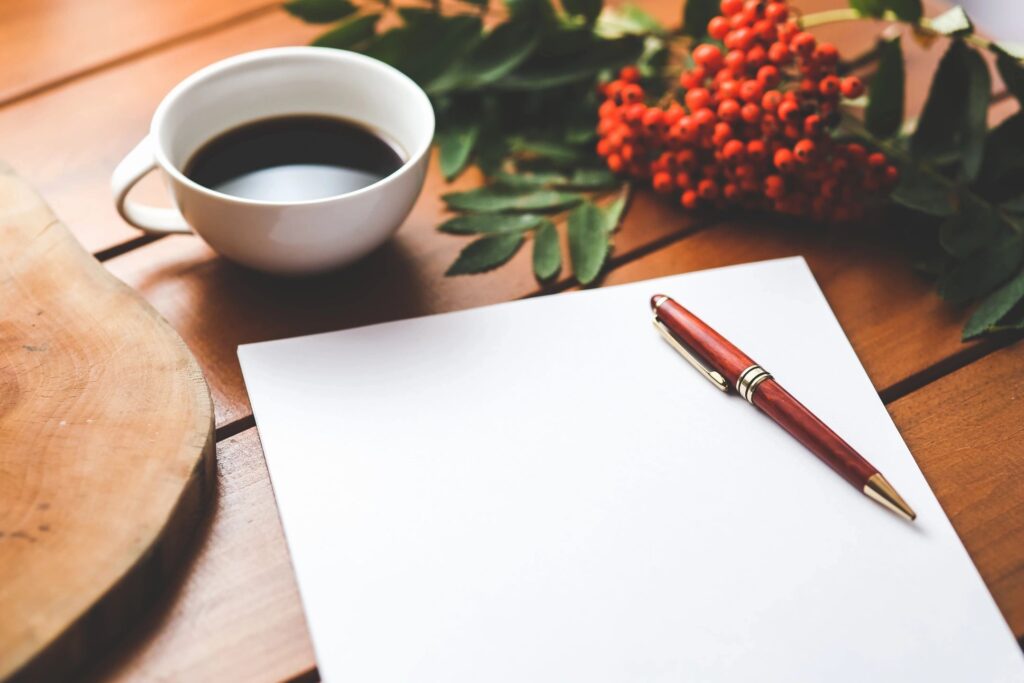Journaling For Self-Discovery: How To Start

I’ve been using journaling as a way of connecting with myself for well over a year and I highly recommend it as a tool for self-discovery. Writing down my thoughts and feelings has helped me to explore and heal old wounds, some of which date back to my childhood, and get curious about myself, my relationships and my purpose in life.
As a kid I was never one for keeping a diary. I couldn’t really see the point and didn’t know what to write in one. I think I was also worried that my brother or my parents might read it. Can you imagine the humiliation? I shudder to think of it, even now.
As an adult, I had occasionally poured my angst onto paper during particularly distressing times but it wasn’t until March 2020 that I began journaling for self-discovery. I now have a daily journaling practice and use my journal to explore specific questions when they arise.
There are lots of journaling methods you can try and I’ll explain the ones I use and what works for me. I’ll also answer some common questions about journaling at the end of this article.
[convertkit form=2063621]
Journaling daily, aka “morning pages”

I began a daily journaling practise that has lasted 18 months and which I fully intend to continue. The idea originates from the Morning Pages that Julia Cameron describes in her book, The Artist’s Way.
Essentially, the first thing you do when you get up in the morning, before the day starts to claim you, is to write in a stream of consciousness whatever is in your head. Put it all down on paper so you don’t have to carry it around in your head, like a journaling meditation.
Keep writing, until you’ve written three A4 pages. If you can’t think of anything to write, then write, “I don’t know what to write” over and over. Sooner or later, you’ll think of something else.
What to write about in a daily journal
If you’re following the Morning Pages principle, the idea is not to worry about what to write, just jot down whatever thoughts bubble up, whether they’re about your curtains, the car or your career.
However, if you’re struggling with things to write in this daily reflection journal, I suggest starting off with how well you slept and consider the reasons for that. If you had a dream that seemed significant, you could write the details down.
I also like to describe how I’m feeling physically and how tired or energetic I am that day as a way of connecting with my body.
You could reflect on what you did the day before, especially the good stuff, and make a note of small wins. I like to dig a bit deeper if something unusual happened, or if the day didn’t go according to plan.
When you are asking yourself questions, don’t come from a place of “What’s wrong with me?”. That’s just assuming that there is something that’s not right and you’ll start berating yourself.
It’s better instead to ask, “Why did I do that?” Consider what triggered the action or response and look for patterns. Is this something you’ve done before? What led up to it? How do you feel about it? Get curious about the circumstances around the event and the thinking that led to your action or emotional reaction.
After reflecting on the past, either recent or distant, depending on what came up during your self-enquiry, you might want to look ahead to the day you’ve got lined up. How do feel about your plans? Do you need to prepare yourself in any way to make it go well?
I like to treat it not as a ‘to do’ list but as a sense of what I hope to achieve and an opportunity to consider any problems that might get in my way and how I could approach or avoid them.
Have an extra notebook for insights
When I’m doing my daily journaling I’ll sometimes have a bright idea, an important insight or something will pop into my mind that needs action.
For those things, I keep a separate little notebook by my side so that I can quickly jot down things to follow up on when I’m done writing.
This has a few key benefits: I don’t have to worry about forgetting things or interrupt the flow of writing too much and I don’t have to trawl through the pages of drivel that I’ve written looking for nuggets of gold.

Journaling to heal
In my daily journal, I often find myself reflecting on my relationships with others as these tend to be the greatest sources of pain in one shape or form.
Sometimes these reflections will take me down a rabbit hole that ends up in my childhood. In doing so, I’ve been able to trace the origins of certain behaviours and beliefs that have been holding me back throughout my life.
These are usually protective strategies I developed as a young child to keep myself safe from rejection or hurt, or beliefs I picked up from my parents, that aren’t helpful now that I’m an adult, such as “Money doesn’t grow on trees.”.
Getting to the bottom of what’s causing you to be stuck at the moment enables you to resolve past issues and move on with your life in a more positive direction. Recognising that your parents, for example, were doing the best they could with what they had might help you to see past events from a different perspective.
This might help you to forgive those who may have done you wrong in the past so that you can be free to live life out of the shadows of that pain.
Get some help with this healing process, if necessary
It’s good to have a dig around in your past, even if it is uncomfortable and upsetting at times.
However, if you are uncovering some quite traumatic stuff or you don’t know what to do with these insights, you might need the help of a coach, or even a counsellor, to help you deal with those things.
Note: It’s important to talk to your prospective coach to make sure you’re a good match before you commit to a coaching programme. Most coaches offer a free discovery call for exactly this purpose.
My way of coping with traumatic experiences was to put them in a mental box and nail it firmly shut, never to be opened again. I left these boxes in the back of my mind for decades, ignoring the influence they’ve had on my life.
Journaling has helped me prise open those boxes and let out some of the nasties. Once you’re aware of a problem, you can start to resolve it.
With the help of a coach, I have been able to let go of long-held resentments and forgive those concerned for some awful things that happened when I was young that have affected my entire adult life.
It’s been liberating!
Journaling for self-discovery using prompts
Another way to use journaling is for exploring something that you’re curious about. If, for example, you want to get clearer about what your life values are, then journaling around that specific thing will be helpful.
As well as the values exercise, you can journal around your work and purpose, things that bring you joy, your relationships with nature and other people and many other topics.
I write these notes in a separate book from my morning pages so that I can easily refer back to them if necessary and I date them so that I can see progress.
You’ll find some starting points in my free 30 journal prompts PDF.
[convertkit form=2063621]
Journaling to deal with anger and hurt
As a young adult, I can recall a few times when I felt particularly distraught, often over a man, and found it cathartic to pour out my feelings onto paper.
As a journaling exercise, writing when you’re angry or upset can not only help you to process difficult emotions, but you might begin to see the situation more clearly.
If you are raging about something that’s happened, it’s more helpful to get all the hurt, blame and resentment down on paper instead of screaming at the person who has upset you. The act of writing these things, uncensored, can help you to shift negative emotions out of your body.
Once you’re feeling calmer, perhaps after a cup of tea, try revisiting your notes and considering what you can learn from them.
Ask yourself questions like: Why did this happen? Was your reaction justified? What about from the other person’s perspective? What needs to happen to resolve the situation? Do you need to set boundaries to prevent it happening again? Do you need to show a bit more compassion?
FAQs about journaling for self-improvement
How long does daily journaling take?
As long as you want but I find it takes me about 20-30 minutes to write 3 A4 pages each morning.
Do I have to do it in the morning?
No.
I like to do it when I first get up as I usually have peace and quiet and it sets me up for the day.
However, if your mornings are already jam-packed and you can’t face getting up half an hour earlier to journal, do it later in the day. It can be a helpful way of getting your worries out of your head before bedtime.
Do I need a special notebook for journaling?
You can invest in a beautiful notebook if you like but it’s not essential.
I use cheap notebooks with pretty covers for my morning pages, although I’m actually thinking of using some of the scrap paper we have accumulated over the years.
I do use a nicer notebook for journalling specific questions.
What if someone reads my journal?
Make it clear to everyone in your household that these are your private notes and not for anyone else to read.
If you don’t trust that they will respect your privacy and you can’t find a suitable hiding place, you can always shred or burn your pages after writing them, in which case, scrap paper is perfect.
Do I have to write 3 pages every day?
No, but having this goal takes you beyond writing a list of what you did and need to do. It gives you space to get curious about what’s going on for you.
If you get stuck, write “I don’t know what to write” a few times until the thoughts start to flow again.
What if I miss a day or go on holiday?
It’s your journaling practice so don’t beat yourself up if life gets in the way and you skip a day or two but try to get back into the habit again as quickly as possible.
It’s up to you whether to take your journal with you when you travel. Your normal routine will be out of whack so you could take a break from journaling or you might find you have more time for self reflection than usual.
Should I read my own journal?
It depends on what you’re journaling about.
If you’ve been exploring a specific question or issue that you’re working on in your life then yes, of course you should read what you wrote, and reflect on it.
For daily journaling, no, not straight away.
When I first started doing Morning Pages I was told not to read them for at least eight weeks. I dutifully waited then set aside some time to go through my notebooks. It was mildly interesting to see what came up on a regular basis, and what had changed in those two months but it too soooo long!
Now that I’ve got my insights notebook for jotting down interesting ideas, I don’t bother reading them, although I haven’t thrown them out.
Can I type my journal?
In theory, yes. After all, it’s your journal. But I wouldn’t recommend it.
The physical process of writing is cathartic in getting things out of your mind and onto paper and means less screen time.
Should I use pen or pencil?
That’s entirely up to you. I prefer to write in pen because it flows nicely on the page.







